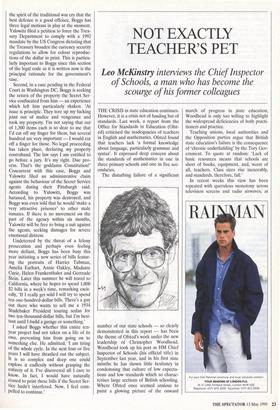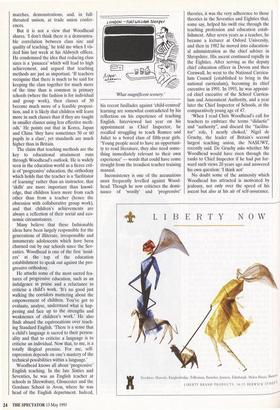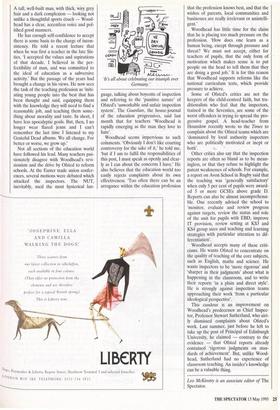NOT EXACTLY TEACHER'S PET
Leo McKinstry interviews the Chief Inspector
of Schools, a man who has become the scourge of his former colleagues
THE CRISIS in state education continues. However, it is a crisis not of funding but of standards. Last week, a report from the Office for Standards in Education (Ofst- ed) criticised the inadequacies of teachers in English and mathematics. Ofsted found that teachers lack 'a formal knowledge about language, particularly grammar and syntax'. It expressed deep concern about the standards of mathematics in one in three primary schools and one in five sec- ondaries.
The disturbing failure of a significant number of our state schools — so clearly demonstrated in, this report — has been the theme of Ofsted's work under the new leadership of Christopher Woodhead. Woodhead took up his post as HM Chief Inspector of Schools (his official title) in September last year, and in his first nine months he has shown little hesitancy in condemning that culture of low expecta- tions and low standards which so charac- terises large sections of British schooling. Where Ofsted once seemed anxious to paint a glowing picture of the onward march of progress in state education, Woodhead is only too willing to highlight the widespread deficiencies of both practi- tioners and practice.
Teaching unions, local authorities and the Opposition parties argue that British state education's failure is the consequence of 'chronic underfluiding' by the Tory Gov- ernment. To quote at random: 'Lack of basic resources means that schools are short of books, equipment, and, worst of all, teachers. Class sizes rise inexorably, and standards, therefore, fall.'
In recent weeks this view has been repeated with querulous monotony across television screens and radio airwaves, at marches, demonstrations, and, in full- throated unison, at trade union confer- ences.
But it is not a view that Woodhead shares. 'I don't think there is a demonstra- ble correlation between class size and quality of teaching,' he told me when I vis- ited him last week at his Aldwych offices.
He condemned the idea that reducing class sizes is a 'panacea' which will lead to high achievement, and argued that teaching methods are just as important. 'If teachers recognise that there is much to be said for keeping the class together for much more of the time than is common in primary schools (where the fashion is for individual and group work), then classes of 30 become much more of a feasible proposi- tion, and it is likely that children will learn more in such classes than if they are taught in smaller classes using less effective meth- ods.' He points out that in Korea, Japan and China 'they have sometimes 50 or 60 pupils in a class', yet standards are much higher than in Britain.
The claim that teaching methods are the key to educational attainment runs through Woodhead's outlook. He is widely seen in the education world as a fierce crit- ic of 'progressive' education, the orthodoxy which holds that the teacher is a 'facilitator of learning' rather than an instructor, that `skills' are more important than knowl- edge, that children learn more from each other than from a teacher (hence the obsession with collaborative group work), and that children's achievements are always a reflection of their social and eco- nomic circumstances.
Many believe that these fashionable ideas have been largely responsible for the generations of illiterate, irresponsible and innumerate adolescents which have been churned out by our schools since the Sev- enties. Woodhead is one of the first 'insid- ers' at the top of the education establishment to speak out against the pro- gressive orthodoxy.
He attacks some of the most sacred fea- tures of progressive education, such as an indulgence in praise and a reluctance to criticise a child's work. 'It's no good just walking the corridors muttering about the empowerment of children. You've got to evaluate, analyse, understand what is hap- pening and face up to the strengths and weaknesses of children's work.' He also finds absurd the equivocations over teach- ing Standard English. 'There is a sense that a child's language is sacred to their person- ality and that to criticise a language is to criticise an individual. Now that, to me, is a totally illogical premise. For me, self- expression depends on one's mastery of the technical possibilities within a language.'
Woodhead knows all about 'progressive' English teaching. In the late Sixties and Seventies, he was an English teacher at schools in Shrewsbury, Gloucester and the Gordano School in Avon, where he was head of the English department. Indeed, `What magnificent scenery.'
his recent fusillades against 'child-centred' learning are somewhat contradicted by his reflection on his experience of teaching English. Interviewed last year on his appointment as Chief Inspector, he recalled struggling to teach Romeo and Juliet to a bored class of fifth-year girls. `Young people need to have an opportuni- ty to read literature, they also need some- thing immediately relevant to their own experience' — words that could have come straight from the trendiest teacher training manual.
Inconsistency is one of the accusations most frequently levelled against Wood- head. Though he now criticises the domi- nance of 'woolly' and 'progressive' theories, it was the very adherence to those theories in the Seventies and Eighties that, some say, helped his swift rise through the teaching profession and education estab- lishment. After seven years as a teacher, he became a lecturer at Oxford University, and then in 1982 he moved into education- al administration as the chief adviser in Shropshire. His ascent continued rapidly in the Eighties. After serving as the deputy chief education officer in Devon and then Cornwall, he went to the National Curricu- lum Council (established to bring in the national curriculum), becoming its chief executive in 1991. In 1993, he was appoint- ed chief executive of the School Curricu- lum and Assessment Authority, and a year later the Chief Inspector of Schools, at the comparatively young age of 47.
`When I read Chris Woodhead's call for teachers to embrace the terms "didactic" and "authority", and discard the "facilita- tor" role, I nearly choked,' Nigel de Gruchy, the leader of Britain's second largest teaching union, the NASUWT, recently said. De Gruchy asks whether Mr Woodhead would have risen through the ranks to Chief Inspector if he had put for- ward such views 20 years ago and answered his own question: 'I think not' No doubt some of the animosity which Woodhead has attracted is motivated by jealousy, not only over the speed of his ascent but also at his air of self-assurance. A tall, well-built man, with thick, wiry grey hair and a dark complexion — looking not unlike a thoughtful sports coach — Wood- head has a clear, accentless voice and pol- ished good manners.
He has enough self-confidence to accept there is some basis to the charge of incon- sistency. He told a recent lecture that when he was first a teacher in the late Six- ties, 'I accepted the values and aspirations of that decade. I believed in the per- fectibility of man, and was committed to the ideal of education as a subversive activity.' But the passage of the years had brought a change in his views. He now sees the task of the teaching profession as 'initi- ating young people into the best that has been thought and said, equipping them with the knowledge they will need to find a reasonable job, and teaching them some- thing about morality and taste. In short, I have less apocalyptic goals. But, then, I no longer wear flared jeans and I can't remember the last time I listened to my Grateful Dead albums. We all change. For better or worse, we grow up.'
Not all sections of the education world have followed his lead. Many teachers pag- sionately disagree with Woodhead's revi- sionism and the drive by Ofsted to reform schools. At the Easter trade union confer- ences, several motions were debated which attacked the inspectors. The NUT, inevitably, used the most hysterical Ian- 'It's all about celebrating our triumph over Germany.'
guage, talking about boycotts of inspection and referring to the 'punitive nature' of Ofsted's 'unworkable and unfair inspection system'. The Guardian, the house journal of the education progressives, said last month that for teachers Woodhead is rapidly emerging as the man they love to hate'.
Woodhead seems impervious to such comments. 'Obviously I don't like courting controversy for the sake of it,' he told me, `but if I am to fulfil the responsibilities of this post, I must speak as openly and clear- ly as I can about the concerns I have.' He also believes that the education world too easily rejects complaints about its own effectiveness. 'Too often there can be an arrogance within the education profession that the profession knows best, and that the wishes of parents, local communities and businesses are really irrelevant or unintelli- gent.'
Woodhead has little time for the claim that he is placing too much pressure on the profession. 'How does one learn as a human being, except through pressure and threat? We must not accept, either for teachers of pupils, that the only form of motivation which makes sense is to pat people on the head to tell them that they are doing a good job.' It is for this reason that Woodhead supports reforms like the national curriculum tests, which provide pressure to achieve.
Some of Ofsted's critics are not the keepers of the child-centred faith, but tra- ditionalists who feel that the inspectors, trained in the Seventies, are some of the worst offenders in trying to spread the pro- gressive gospel. A head-teacher from Hounslow recently wrote to the Times to complain about the Ofsted teams which are `dominated by local authority inspectors who are politically motivated or inept or both'. 4 ' Other critics also say that the inspection reports are often so bland as to be mean- ingless, or that they refuse to highlight the patent weaknesses of schools. For example, a report on Avon School in Rugby said that the teaching was 'generally satisfactory' when only 5 per cent of pupils were award- ed 5 or more GCSEs above grade D. Reports can also be almost incomprehensi- ble. One recently advised the school to `monitor, evaluate and review progress against targets, review the status and role of the unit for pupils with EBD, improve IT provision, review setting at KS3 and KS4 group sizes and teaching and learning strategies with particular attention to dif- ferentiation'.
Woodhead accepts many of these criti- cisms. He wants Ofsted to concentrate on the quality of teaching of the core subjects, such as English, maths and science. He wants inspectors to be 'more rigorous' and `sharper in their judgments' about what is happening in the classroom, and to write their reports 'in a plain and direct style'. He is strongly against inspection teams approaching their work 'from a particular ideological perspective'.
This candour is an improvement on Woodhead's predecessor as Chief Inspec- tor, Professor Stewart Sutherland, who airi- ly dismissed complaints about Ofsted's work. Last summer, just before he left to take up the post of Principal of Edinburgh University, he claimed — contrary to the evidence — that Ofsted reports already contained 'rigorous judgments on stan- dards of achievement'. But, unlike Wood- head, Sutherland had no experience of classroom teaching. An insider's knowledge can be a valuable thing.
Leo McKinstry is an associate editor of The Spectator.




































































 Previous page
Previous page